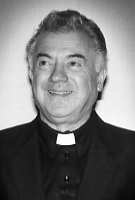
Father George J. Hirschboeck, MM
Born: June 6, 1922
Ordained: June 11, 1949
Died: June 2, 1993
Father George Joseph Hirschboeck died in Japan on June 2, 1993 at 10:10 p.m., Tokyo time. On May 10th, during a trip into Russia, he fell ill, but returned to Tokyo where he was hospitalized. His Regional Superior said: “He used every ounce of energy to accomplish what he thought God was calling him to do.” He was 71 years of age and a Maryknoll priest for 44 years.
Father George Hirschboeck was born on June 6, 1922 in Milwaukee, Wisconsin, son of George H. and Katherine Kuchler Hirschboeck. He had one brother and two sisters. He was a cousin to the famous Sister Mary Mercy Hirschboeck, M.M. He attended St. Michael’s Parochial School for 4 years and St. Anne’s Parochial School for 4 years, and graduated from St. John’s Cathedral High School in June 1940. His association in high school with young volunteers in the Catholic Worker’s House of Hospitality in Milwaukee had a strong influence on young George for service to other people. He entered Maryknoll Apostolic College (Venard) on August 1,1940. After two years at the Venard, George moved on to the Maryknoll Seminary, Ossining, New York, for philosophy and theology studies. During the seminary years he developed a personal interest in and knowledge of the Eastern Byzantine Rites. He was ordained a priest at Maryknoll Seminary in Ossining, on June 11, 1949.
After ordination, Father Hirschboeck was assigned to the Maryknoll Mission in Kaying, South China, but, due to the Communist take over of the country, the assignment was changed on June 7,1949 to the Maryknoll Mission in Kyoto, Japan. He spent his entire mission apostolate of 44 years in Japan, except for a short period in development work in Chicago and Milwaukee. After language and cultural studies he was assigned as assistant pastor to the Catholic Mission in Tsu, near Kyoto. In 1951 Father Hirschboeck became pastor of the Catholic Mission in Kinugasa, Kyoto. He was a zealous, prodigious worker and a good student of current events with an interest in social problems among his people. His Superior wrote of him: “Father Hirschboeck is a good missioner with a fine knowledge of the language and one of the best in making converts. He has developed his parish into one of the best. He knows how to use his help and his curates to good advantage.”
Among the many projects he engaged in were the Cursillo Movement and the Jocist Labor Movement among local weavers. As a means of combating Communist propaganda among the young University students he built a two-room Youth Club named in honor of Christ the King and founded a University Students Hostel. He founded a cooperative workshop to provide employment for patients released from a nearby tuberculosis hospital, and engaged in other charity and social works in Kyoto, Japan. The story of his relief work was written up in the book entitled The Meaning of Maryknoll by Father Albert J. Nevins, M.M.
In June 1959, Father Hirschboeck was appointed First Consultor to the Regional Superior for a term of three years. In 1967, he was transferred to the Tsu-Minami Parish and developed a well organized parish. In 1970, he went to the Philippines for catechetical studies and training at the East Asian Pastoral Institute. Upon returning to Japan, he founded in 1972 the Kyoto Catechetical Center which he directed for seven years before handing it over to the Local Church. At this point in his life he became a victim of Guillaume-Barre Syndrome which paralyzed him from the neck down for several months. After making an almost miraculous recovery he went to Tokyo to develop the Maryknoll Hermitage of the Heart Prayer Center, which functions as a missionary outreach through sharing Christian forms of prayer and meditation with Christians and non-Christians. He worked with many charismatic and other prayer groups in Tokyo, as well as fostering relationships with priests, monks and laity of other religions, as well as those of the Eastern Byzantine Rites. He studied Eastern Christian Spirituality, Mystical Theology and Oriental Studies and took courses with Zen groups.
In February 1981, the Roman Congregation of the Oriental Church granted him the bi-ritual faculty to celebrate the Liturgy in the Byzantine Rite. He carried on a Byzantine apostolate, traveling much in Russia and Eastern Europe in order to see what the Church has to do to rebuild those areas, where it was almost suppressed by Communists. He was returning from his latest trip when he suffered his ultimately fatal heart attack.
Wake service Thursday, June 3rd, Roppongi Chapel Center, Tokyo, Japan. Concelebrated Mass of Christian burial, Friday, June 4th, 11:45 a.m., Roppongi Chapel Center. Concelebrated Memorial Mass offered in Queen of Apostles Chapel at Maryknoll, New York, on Monday, June 7th, with Father Francis A. Riha as principal celebrant and Father John J. McAuley as homilist.
